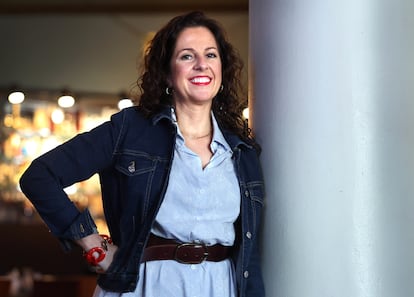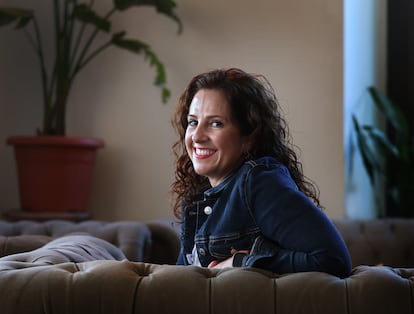Inés Pineda-Torra, biochemist: ‘If a woman is the emotional support of the household, she’ll make dinner before going to the doctor’
The researcher has received a grant worth more than $1 million from the AXA Research Fund. It will support her work on the cardiovascular risks that women face during menopause

Inés Pineda-Torra, 53, doesn’t stop laughing throughout her interview with EL PAÍS. It’s her way of dealing with all the dramatic and difficult situations that she’s experienced throughout her professional career. Also, she’s in a good mood: the biochemist has just received a grant worth over $1 million from the AXA Research Fund (started by the French multinational insurance company of the same name) to investigate the cardiovascular risks that women face during menopause.
Although she completed her undergraduate studies in biochemistry at the Complutense University of Madrid, Pineda-Torra has carried out almost all of her professional activity outside of Spain. She earned her doctoral thesis at the Pasteur Institute in Lille, France, spent her postdoctoral period in New York — first at Memorial Sloan Kettering and then at NYU — and then returned to Europe to join University College London, where she became a research professor.
“I’d been in London for almost 15 years when the opportunity arose to come to Spain, to the Andalusian Center for Molecular Biology and Regenerative Medicine, in Seville. My life has changed radically,” she notes.
Question. Is this change in your life for the better?
Answer. For all of my [career], I’ve worked on lipid metabolism and the molecules that are involved in its regulation. But a while ago, I started working with a rheumatologist and an immunologist on cardiovascular risks in women who have autoimmune diseases, such as lupus. As a result of that, I realized how much of a lack of information there is about cardiovascular diseases at the molecular level in women, because most of the studies are done on men. It’s a niche that needs to be covered. I’ve been lucky enough to get the financing to be able to do it.
Q. You make it sound easy.
A. In one of the attempts, there was an evaluator — of course, in my mind, it had to be a man who would express such an opinion — who went so far as to say: “I don’t understand why you only want to do research on women. This project isn’t justified.” If I want to study the effect of menopause on cardiovascular diseases, who else am I going to research? I have to say that the more diverse an evaluation committee is, the more welcome these types of projects are. And, as the years go by, these types of comments don’t matter to me.
Q. Tell us about your research.
A. Cardiovascular diseases are the leading cause of death in women, but prevention campaigns have always been linked to men. In my talks, I usually show a woman having a heart attack, because it’s something that’s normally not seen. There are studies that show how the time between the appearance of symptoms, the transfer to the hospital and the moment in which treatment is received is much longer in women than in men. Sometimes, it’s because we don’t recognize the symptoms… and other times, it’s because we simply think we feel bad and that’s it. There’s a higher proportion of men who experience heart attacks, but there are also more women who suffer strokes. The problem is that, with menopause, as the levels of sex hormones alter, many things change in our bodies. We’re no longer so protected.
Q. It’s a big downturn.
A. Our duty is to tell it like it is. I see a lot and hear a lot from a gynecologist in the United Kingdom, Louise Newson, who has intensely campaigned for these issues [to be addressed]. But it’s not just about identifying the symptoms: the problem is that practically all organs are affected by estrogen, which is why the effects are so diverse. For example, it’s not that we don’t concentrate during that period of our lives, it’s that the brain also produces estrogen and cognitive ability declines. There are pathologies — such as anxiety and depression — that are related to hormonal decline. And, precisely because of ignorance, anti-anxiety drugs or antidepressants are prescribed [to women going through menopause], when perhaps hormonal treatment would get to the root. We cannot focus only on hot flashes, because there are women who don’t have them. It’s not that we all suddenly start sweating.
Q. Imagine how impactful that moment is in a woman’s life.
A. [Laughing]. I always remember an interview with Michelle Obama, in which she said that she was in a meeting in the Oval Office and had a hot flash. They also come to us in moments of anxiety or stress. It’s good that she spoke about it, because if it were normalized, it wouldn’t be a big deal if a woman asked for the air conditioning to be turned on — there wouldn’t be a need for her to give an explanation.
By the way, although I’m going a little off topic, [I want to say that] the measure of setting the temperature in public buildings to [68-or-so] degrees… if you have menopause or are pregnant [and if it’s 104] degrees outside it’s as if they put you in an oven. Has anyone taken this into account?

Q. It affects our performance at work, too.
A. In the United Kingdom, a survey was carried out on this issue and published. It occurred to me to propose doing the same in Spain. [Laughing]. I won’t forget the look on people’s faces. They told me: “Such things are for the [Ministry of] Equality.” But it has nothing to do with equality — this is about health.
Q. Let me go back to the amount of time it takes women to get to the hospital. Do we endure more? Do we ignore our own symptoms? Does our role as caregivers in society have any influence?
A. I think there’s an important factor, which is the role that each woman plays in her family environment. If they’re the emotional support [system in the household] and always put others before their own health, they’ll make dinner before going to the doctor. I remember a talk I attended in which a woman said that she was in a gym in New York and was having a heart attack. She thought to herself: “I’m very tired today, but come on now, don’t be lazy.” She finished her workout, she got on a plane… and when she landed in London, since she continued to feel unwell, she went to a hospital and they told her that her condition wasn’t fatigue, but a heart attack.
Q. Earlier, you mentioned that some markers are visible, while others are not. Which ones are?
A. There are some universal [signs] in both men and women. Having a high cholesterol level is harmful, but it’s true that women — generally up until the age of 50 — have very high levels of good cholesterol. We’re relatively protected. But from that age onwards, good cholesterol drops a little… and it’s the bad cholesterol that skyrockets. Then, there are other factors, such as high blood pressure [or] obesity, which, despite not always being taken into consideration, are intrinsic to women. Complicated pregnancies, premature births, births with babies smaller than normal, preeclampsia, hypertension during pregnancy... these are all known to have an effect, but we don’t know how. There’s much to be done [in this field].
Q. What role do primary care professionals or specialists play here?
A. Even among healthcare professionals, there’s enormous ignorance about menopause. With my research, I have two objectives: to give visibility [to the condition] and ensure that, when studies are done on women, they don’t solely focus on motherhood. I have nothing against those who research reproduction, but there are other things to look at! [Menopause] isn’t something that affects a certain group, it happens to all of us who reach a certain age. And, to some, even earlier. Another thing I want to achieve is to generate the knowledge required to develop the tools that allow us to evaluate cardiovascular risks in a much more detailed and precise way. All of this, in any case, has changed thanks to legislation.
Q. Tell me about that.
A. In the United States in 1993, the NIH (the National Institutes of Health) ordered that no clinical research be funded that [didn’t involve the inclusion] of women. This was also the case [with research involving] animals, with both males and females being included. If [research is gender-specific], it must be justified. That decision represented a radical change. It’s also been done in Europe (at EU level), but at the national level, not so much.
Q. On social media, you demand that public researchers receive better conditions. You also critcize gender bias. Before turning on the recorder, you were telling me about how much it irritates you that people refer to you and your fellow female researchers as “the girls.”
A. It makes me sick. Do you know that, in Spain, there are still research funding agencies that don’t take pregnancies into account when looking at women’s scientific careers? Hence, it’s very complicated to comply with the requirements [to secure funding]. That no longer happens in [progressive] countries… it really shocks me that, here [in Spain], we still have to fight for it.
Q. And how does that get fixed?
A. By going after the money. Years ago, a program was created in the United Kingdom to promote women in science but no one paid any attention to it, until the director of the Health Research Authority arrived and said: “From now on, we won’t fund any universities that don’t [abide by] the evaluation of [gender biases] and the gender perspective.” The moment you touch the money, everyone gets motivated. A few action plans emerged!
Translated by Avik Jain Chatlani
Sign up for our weekly newsletter to get more English-language news coverage from EL PAÍS USA Edition
Tu suscripción se está usando en otro dispositivo
¿Quieres añadir otro usuario a tu suscripción?
Si continúas leyendo en este dispositivo, no se podrá leer en el otro.
FlechaTu suscripción se está usando en otro dispositivo y solo puedes acceder a EL PAÍS desde un dispositivo a la vez.
Si quieres compartir tu cuenta, cambia tu suscripción a la modalidad Premium, así podrás añadir otro usuario. Cada uno accederá con su propia cuenta de email, lo que os permitirá personalizar vuestra experiencia en EL PAÍS.
¿Tienes una suscripción de empresa? Accede aquí para contratar más cuentas.
En el caso de no saber quién está usando tu cuenta, te recomendamos cambiar tu contraseña aquí.
Si decides continuar compartiendo tu cuenta, este mensaje se mostrará en tu dispositivo y en el de la otra persona que está usando tu cuenta de forma indefinida, afectando a tu experiencia de lectura. Puedes consultar aquí los términos y condiciones de la suscripción digital.









































